Haim Watzman
Fireflies, forgotten for many years, reappear one summer evening.
Shabbat, Riverside Park, along the Hudson. Under the shelter of tall trees, runners race by. Couples stroll, families with small children sprawl on the grass. The first flashes, as the sun drops low over New Jersey, catch me by surprise. Then the tears begin.
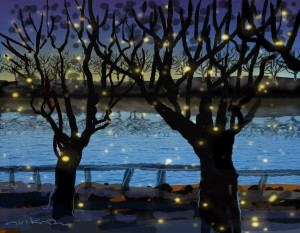
illustration by Avi Katz
It is like a dream. Niot’s look of pure delight and wonder when he sees fireflies for the first time. He is twelve years old, or perhaps ten. We are in Silver Spring, at my parents’ home. I am sitting in an armchair reading a newspaper. Twilight falls. Niot appears behind the frame of the large sliding glass door that separates the family room from the backyard. He catches my eye, then turns his gaze to the yard. Points of weightless brilliance as day slides into night.
“Specks of living light / twinkling in the dark,” Tagore calls them. The picture is clear and present to me in the park at dusk, as clear as if I were again in that armchair and Niot beyond the sliding door.
When Niot first began to appear in my dreams, he was far away, visible for an instant, then gone. I wept in my sleep.
How could light make me cry? How could a creature showing itself to the world make me feel that world as empty? The firefly’s light is a cold light. It startles but it does not warm.
Winged embers mark trails along the river, like comets flying close to the sun, tails aimed at me.
Perhaps only I see them? Runners lope by with buds in their ears, bikers swerve, unperturbed by the orbs. The gazes of families, focused inward, are not drawn out. Here and there a toddler points a finger, reaches out, and then, hopes disappointed, turns back to those it loves.
Aloft in daylight, a firefly has no soul. It is nothing if not seen.
I do not see Niot on the evening I know I will, soon after he died. I am on my way to meet my family at a café. Suddenly, some steps from home, a certainty overwhelms me: Niot will be there, too. His accident, the day and a half in intensive care, the harvest of his organs—all that was staged. A farce, a test, an illusion, a dream. He will laugh at my gullibility.
I know it cannot be, but am no less confident for that knowledge. When I arrive at the café, he is not there.
The firefly flies longer than it shines.
***
Later, Niot stays for longer. Twice or three times I touch him.
I sit in a cab, squeezed between Niot and his brother. His body presses up against mine. He laughs, a laugh that I hear and also feel as it courses through his body. I put my arm around him and bring his head close to me. Then I wake up.
As the sun disappears behind Hoboken, the lightning bugs illuminate the night. The walkers on the paths fade; the trees blend into the darkness. The night weighs heavily; on the streets and highways demons clatter and roar, the muffled cries of pandemonium. Are these spectral beetles not the lesser terror? But you cannot navigate by their light, nor can one follow the phantoms. They lead in all directions.
I and several other people are in a long, narrow room with two sets of bunk beds on either side, as in a youth hostel. A woman speaks—she is a teacher, but also a doctor. Niot is in a drawer under the bottom bunk of one of the beds. The woman strides over an tries to open the drawer, but cannot because the opposite bed blocks it. I offer to push the offending bed aside, but she just keeps pulling. I tell her it is no use, Niot is dead. “You are not the person to determine that,” she informs me. Finally, contorting herself, she manages to yank the drawer open. Niot lies there. She examines him and pronounces: “He’ll come out of it.” Niot has many bruises. He opens his eyes and asks: “Abba, when will I be able to get out?” I weep, go on my knees to embrace him and tell him how much we all miss him. Then I wake up.
I try to flee. I find a path that ascends to the world above, but it is steeper than it looks in the dark and I cannot climb. My strength gone, I sit on the grass and fireflies flit around me. Such are souls in Hades. Not even heroes or musicians can retrieve them. Sometimes they are called shades, but here they are sparks.
Philosophers speak sometimes of the spark of life. But life is not a flash, a flicker, a glimmer, a glint. You do not just see it in the dark. It is felt, it touches, it sounds, it smells. Is this not how we tell the fantasies of the night from the truths of the day? In dreams we most often only see and hear, seldom smell or taste, only sometimes touch. The touch of one’s child’s body is more real than truth. If it is in a dream, the dream is real in a way that much is not.
Sitting in the park, I swipe a firefly out of the air. But you cannot touch a firefly. In the hand, it disappoints. It crawls, it flutters; soft and small, it hardly seems alive. Nothing of the warmth and weight of his body against mine. Better to free it and dream.
***
I rise and return to the path. Fireflies dart across it, blocking my way. A couple, holding hands and deep in conversation, passes me in the dusk. They are not deterred. I brave the bugs, the blinking luminescence of the dark. Is that not what laughter is?
Niot’s laugh lit up many a darkness. He laughed naturally, frequently, at jokes, at pretenses, at the foibles of others, at himself. A rolling laugh that twinkled for seconds, faded, and then burst again into light. Perhaps when laughs die they become fireflies of a summer evening, flaring after sundown.
A biker, braking, rolls past me. In recent dreams, Niot keeps a middle distance. Just a few weeks ago, in the midst of a long saga dealing with other matters entirely, he suddenly appears. There he is in our home, wearing shorts, looking as he did in high school. I am delighted to see him, but I have to go out to deal with my dream affairs. I also realize that Niot’s presence is a mistake. He is not supposed to be here and sooner or later the error will be noticed and he will be gone.
I ask him what his plans are and he says noncommittally that he doesn’t have any. I think to myself that, obviously, it is difficult for him to plan because he does not know when he will be dead again. And I realize that, when that happens, I and the family will have to mourn again all over from the start, and the thought is too painful to bear. I am caught at the door. Niot is right there before me, but more than an arm’s reach away.
The path winds, switching back on itself as it ascends. I hear the heavy breathing of a runner who soon passes me from behind. The hubbub of the city grows louder. Out of the corner of my eye I see a traffic light change from red to green. Before the final climb to the street I turn around and look between the trees. The air-fires are fewer; twilight, their time to shine, is nearly over. The souls return to their burrows, their shelter behind the bark of maples and beeches. I hear the shouts of boys playing basketball and the whine of a small child. But my tears are gone, I no longer weep, I have a destination and much to do. A few final steps and Niot is no longer close. He is nearby, always nearby, but more than an arm’s reach away.
Niot, on the far side of a glass door, pointing in happy astonishment at flying radiance.
“I leave no trace of wings in the air / but I am glad I have had my flight,” says the poet.
Sometimes a firefly burns for twenty years before going out.
^^^^^^^^^^^^^^^^^^^^^^^^^^^^^^^^^^^^^^^^^^^^^^^^^^^
For information on and donations to the Niot Project to help teenagers with learning difficulties, please go to the Niot Project webpage .
Quotes from “Fireflies” by Rabindranath Tagore
Necessary Stories about Niot:
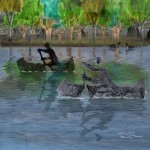 Desertion (on SoJo)
Desertion (on SoJo)
Meditation: When a child dies, he becomes incessantly present.
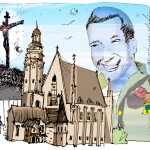 A Him to him (on SoJo)
A Him to him (on SoJo)
Meditation: A letter to Bach on the loss of my son.
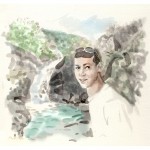 Other Nights (on SoJo)
Other Nights (on SoJo)
Meditation: The Seder, chamber music, and the death of my son.
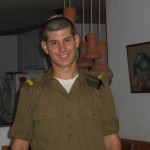 The Day of His Birth
The Day of His Birth
Meditation: On the death of my son.
More Necessary Stories!





